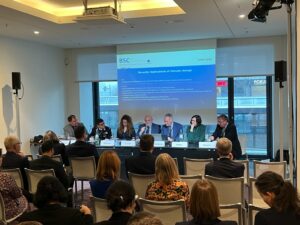EUROMIL participates at the 22nd Berlin Security Conference
EUROMIL participated as logo partner.
The Berlin Security Conference took place on 29-30 November and this year’s topic focused on enhancing resolve and resilience in Europe and NATO.
At the beginning of the conference it was underlined that war is back in Europe since February 2022 when Russia invaded Ukraine, and NATO, especially after the Vilnius Summit, is focusing on enriching its combat ready forces while strengthening its defence and deterrence. The EU should also advance its defence capabilities to strengthen the European pillar in NATO. In this regard, it was noted that the past two years the EU has achieved more than anyone believed it would before the war, and is on the path of becoming a strategic geopolitical actor. Defending the world order was a main point of reference by Katja Keul, Minister of State, Ministry of Foreign Affairs, Germany, who highlighted the need for contributing to a more sustainable order as well. Thus, Germany will soon publish climate change diplomacy strategy.
The President of EUROMIL, Emmanuel Jacob, participated at a Panel discussion on the security implications of climate change to the transatlantic security. The panel scrutinized the effects of climate change on multiple aspects of security. To provide a few examples, climate change negatively affects women (WPS) especially when there is resource scarcity, also in some regions the effects are more obvious than in others, as in the Sahel. Besides, the financial consequences of climate change are deeply affecting societies. Regarding, defence, the role of NATO was presented, which aspires to become a leading organisation in this regard. Especially, after the Vilnius Summit where NATO published its Climate Change Action Plan, the Alliance endeavours to make sustainable Armed Forces able to respond to different environments while also reducing their own environmental footprint.
On military personnel, Emmanuel Jacob stated that the Armed Forces are more and more often dealing with natural disasters without being proper trained nor equipped. That also has a negative impact on Recruitment and Retention of personnel. Hence, it has become imperative to have specialised forces able to respond to the emerging threats and challenges that are posed by climate change. In this regard, the transatlantic community should explore alternatives. Australia for example, is setting up its reserve forces as specialised ones to deal with environmental hazards. Emmanuel Jacob also suggested that the EU can also build such a force, a kind of “Frontex” for climate change. We should not forget that military personnel are just men and women who should be able to protect themselves. Lastly, at the panel discussion Brigadier General Raffaele Pio Manicone, Carabinieri presented a new initiative, regarding their centre of excellence on climate change.
To continue, the first day of the conference stressed the need to build the Armed Forces for the future through improving their operational readiness, by also improving the reserve system and explore the possibilities of various initiatives as building a military Schengen area.
At the second day of the Conference, Germany’s Defence Minister Boris Pistorius and the Dutch Defence Minister Kajsa Ollongren stated that support to Ukraine will be provided for as long as it will be needed. It is also important to strengthen the European pillar in NATO and through synergies to improve interoperability. European states should procure, work and train their forces together, as sets the example of the German- Dutch brigade. It should also not be forgotten that the world is facing many challenges – not only the war in Ukraine – but also the situation in the Western Balkans, the Caucasus, in the Sahel and in the Middle East. Minister Pistorius also stated that there is an important issue on personnel, and is essential to make the Armed Forces an attractive workplace again.
On behalf of the European External Action Service (EEAS), Charles Fries, presented the various developments that have taken place in the European security and defence area, as the Strategic Compass, EUMAM, the strengthening of the European Defence Technological and Industrial Base (EDTIB), and the Rapid Deployment Capacity (RDC). Concerning the latter, it was highlighted that last month the first ever EU live exercise took place in Spain. MEP Gahler in this regard commented that we need to make the RDC more ambitious by having permanent stationed forces. However, Charles Fries responded that the RDC was already a compromise and we need to take one step at a time.
Overall, the discussions continued by focusing on Ukraine, capability planning, hybrid threats, the situation in the Indo Pacific, and the importance of resilience by equipping the Armed Forces with high-end capabilities, making them interoperable and interchangeable.
The 23nd Berlin Security Conference will take place on 19-20 November 2024.


